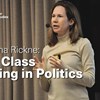proportion

Serious recreational sports as health and wellness promotion activities at work
The overall purpose of our project is to investigate the consequences of demanding forms of sports and recreational races as health and wellness promotion activities at work. What norms, conditions and prerequisites surround them?
Welfare States, Social Structure and the Dynamics of Poverty Rates. A comparative study of 16 countries, 1980-2000
This paper attempts to explain temporal and spatial variation of poverty rates in terms of unemployment insurance and socio-demographic factors, and test the ‘convergence hypothesis’ of the poverty ra

Martin Kolk: Low-fertility countries are responsible for almost all of the CO2 emissions
Do we need to reduce population growth to address the climate challenge? From the perspective that each person contributes to green house gas emissions and resource consumption, it is a logical though
#YouToo? When the predator is your partner
The #MeToo movement has recently been praised by the United Nations experts in women’s human rights. Yet if sexist violence against women has been under the spotlight and denounced in every context ov
Research seminar with Johanna Rickne: The Class Ceiling in Politics
Venue: Institutet för framtidsstudier, Holländargatan 13, 4th floor, Stockholm, or online.Research seminar with Johanna Rickne, professor of Economics at SOFI, Stockholm University.Register hereAbstracPrior studies have documented that working-class individuals rarely become parliamentarians. We know less about when in the career pipeline to parliament workers disappear, and why. We study these questions using detailed data on the universe of Swedish politicians’ careers over a 50-year period. We find roughly equal-sized declines in the proportion of workers on various rungs of the political career ladder ranging from local to national office. We reject the potential explanations that workers lack political ambition, public service motivation, honesty, or voter support. And while workers’ average high school grades and cognitive test scores are lower, this cannot explain their large promotion disadvantage, a situation that we label a class ceiling. Organizational ties to blue-collar unions help workers advance, but only to lower-level positions in left-leaning parties. We conclude that efforts to improve workers’ numerical representation should apply throughout the career ladder and focus on intra-party processes.

Johanna Rickne: The Class Ceiling in Politics
Research seminar with Johanna Rickne, professor of Economics at SOFI, Stockholm University Abstract: Prior studies have documented that working-class individuals rarely become parliamentarians. We kno
Vaccine confidence is higher in more religious countries
Human vaccines and immunotherapeutics Abstract Vaccine hesitancy is a threat to global health, but it is not ubiquitous; depending on the country, the proportion that have confidence in vaccines ranges
Discontinuous and continuous stochastic choice and coordination in the lab
Journal of Economic Theory, vol. 206, 2022. Abstract We experimentally test theoretical predictions on equilibrium selection in a two-player coordination (investment) game. Through a minimal visual vari
Are animals needed for food supply, efficient resource use, and sustainable cropping systems? An argumentation analysis regarding livestock farming
Food Ethics, vol. 9 Abstract It has been argued that livestock farming is necessary to feed a growing population, that it enables efficient use of land and biomass that would otherwise be lost from the

Jerzy Sarnecki - Immigration and crime development at the national and municipal levels
Research seminar with Jerzy Sarnecki, senior professor of criminology at Stockholm University and researcher at Institute for Futures Studies. A large number of Swedish studies show that immigrants ar








